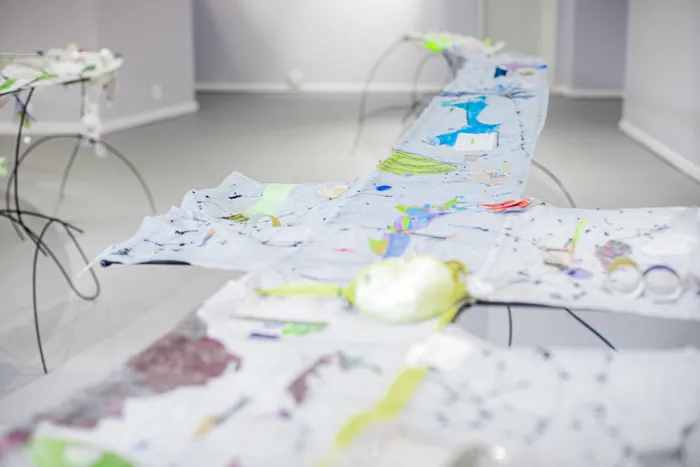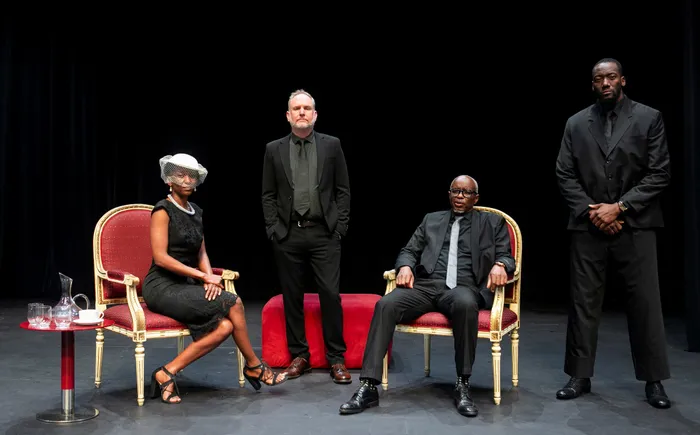National Arts Festival at 51: A celebration of artistry, purpose and possibility
The festival’s success rests on the shoulders of many
As the National Arts Festival (NAF) celebrates its 51st year, it’s impossible not to marvel at the evolution of South Africa’s most significant cultural gathering. What began over five decades ago as a humble celebration of theatre has blossomed into a multidimensional creative force, alive with dance, music, comedy, visual art and literature. The festival’s success rests on the shoulders of many, from the curatorial brilliance of Rucera Seethal and her artistic committee to the behind-the-scenes magic of the technical team. Together, they’ve shaped a programme that entertains, provokes, and inspires.

To teach in ways that teach us to care for the soul.
Image: Supplied
This year’s opening week has already delivered a cascade of emotion and artistic brilliance. Cape Ballet Africa’s SALT was a breathtaking fusion of classic and contemporary movement. Featuring original works by Mthuthuzeli November, Kirsten Isenberg, and Michelle Reid, the production balanced the elegance of Balanchine’s Allegro Brillante with evocative new works like Chapter Two and Smoke. It was a masterclass in choreographic storytelling and set a high bar for the week ahead.
Holding its own within the visual art space is Teaching In Ways That Teach Us To Care, an experiential exhibition by Nyakallo Maleke, the 2025 Standard Bank Young Artist Award recipient for Visual Art. The installation is unlike anything I’ve encountered before: raw, emotionally resonant, and technically meticulous. At its heart is a striking 40-meter sheet of baking paper, a material so delicate that stitching through it feels almost defiant. And yet, it holds stories.
Crisp packets folded with intention, empty bottles, pebbles wrapped in plastic, each found object becomes a symbol, each stitch a quiet assertion. The baking paper’s translucence gives way to moments of brightness: vivid threads and detailed embellishments that conjure memories of childhood, vulnerability, and quiet strength.
Scattered throughout are collaborative steel structures, installations with root-like legs that seem to grow from the ground itself. During a walkabout, audience members interpret these legs as metaphors for resilience, balance, and survival. They evoke a sense of being held, grounded despite life’s fragility.
Road, a dance piece performed by Oscar Buthelezi and Muzi Shili, explored the metaphorical and literal paths we travel in life. With no spoken word, their physical storytelling transcended language, tapping into themes of burden, resilience, and connection. Its international acclaim is well-deserved.
Then came Messy, a bold, irreverent one-woman show by Samantha Carlisle. Equal parts hilarious and gut-punching, the piece explores sex, intimacy, and emotional detachment through the lens of an online sex worker. Carlisle’s shapeshifting performance confronts societal shame and misogyny, offering a liberating space for women’s voices in conversations around pleasure and agency.
But it was Isilwane Esimnyama (The Black Beast) that delivered one of the festival’s most searing moments. Written and directed by Abednigo Dhlamini, the production honours the life and brutal death of Uyinene Mrwetyana. Through ritual, physical theatre, and poetic dialogue, the play invokes her spirit and demands justice. It’s not just theatre, it’s protest, mourning, and memory.
One of the most exciting transformations this year has been the growth of the Literature Festival. Under the guidance of new curator Busisiwe Jemsana-Mantashe, the Lit Fest has been fully integrated into the core NAF programme.
No longer a peripheral event, the Literature Festival is flourishing with vibrant conversations, panel discussions, and workshops led by legends like Dr John Kani, Aubrey Sekhabi, Dr Jerry Mofokeng, and Khaya Dlanga. It also embraces an expansive view of literature, encompassing plays, poetry, and outreach initiatives with juvenile offenders.
“The aim was to bring literature into the heart of the festival,” says NAF CEO Monica Newton. “And Busi has done that beautifully. The Lit Fest now feels integral to the wider NAF experience.”

The cast of Breakfast With Mugabe.
Image: Supplied
Looking ahead to the second week, the festival’s momentum shows no signs of slowing down. Breakfast with Mugabe, a gripping political drama by Fraser Grace, will be staged under the direction of 2025 Standard Bank Young Artist Award recipient Calvin Ratladi. Tackling power, trauma, and psychological warfare, it promises to be one of the most talked-about productions of the week.
Also debuting is Marlow and the Moon Maiden, a whimsical, family-friendly circus-theatre hybrid directed by renowned theatre-maker Janice Honeyman. It’s a delightful offering for younger audiences, combining visual spectacle with storytelling magic.
Performance work continues to shine, with rising choreographers redefining the genre for younger audiences. One standout is Bridling, a collaboration between playwright Nadia Davids and choreographer Jay Pather. Adapted from David’s 2024 Caine Prize-winning short story, the production explores power dynamics in the arts through the journey of a young actor. Performed by Buhle Ngaba and dancer Shaun Oelf, it’s a layered, unsettling work about creativity, feminism, and rebellion.
Music lovers can look forward to performances by acclaimed acapella group The Soil, who will be joined by winners of the inaugural Igwijo competition. It’s part of the festival’s broader vision to welcome diverse genres, from amapiano to gospel, into traditionally exclusive spaces.
Local legend Dumza Maswana also takes the stage, bringing his soulful voice and deep Eastern Cape roots to the spotlight. A longtime collaborator with NAF, Maswana represents the festival’s commitment to nurturing homegrown talent. And of course, all eyes are on the Ovation Awards, a festival tradition that does more than celebrate talent; it launches careers.
“It’s a small ceremony with big meaning,” says Newton. “For many artists, it’s the beginning of their next chapter.”
But perhaps the most remarkable thing about the National Arts Festival is its ability to be many things at once: a global stage for new work, a local platform for social innovation, and a space where difficult conversations are welcomed, not silenced. Whether it’s through raw, confronting pieces like Isilwane Esimnyama or through the collaborative beauty of recycled sculpture, Purch GarboGoyles, NAF remains fearless in its pursuit of relevance and resonance.
“This festival doesn’t happen without artists. Artistry doesn’t happen because of us. We happen because of artistry," Newton concludes.
The National Arts Festival is currently underway in Makhanda until July 6.
Related Topics: